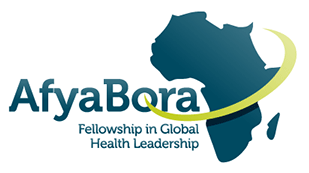Fellowship Overview
Overview
The Afya Bora Consortium Fellowship was created to train future leaders in global health. The focus is on African health professionals, but also includes U.S. trainees. The Fellowship has two major components, a set of didactic modules and an assignment at an Attachment Site. The didactic modules provide trainees with basic knowledge and a variety of practical skills relevant to effective leadership, while the assignment at an Attachment Site provides practical experience in an African health organization and environment.
Trainees
The one-year training program targets African and U.S. medical post-graduates, post-residency physicians, and graduate nurses with the majority of trainees from Africa. One important element of the program is the inclusion of both U.S. and African trainees who are both nurses and physicians. We believe that this mix will enhance the quality of the leadership training experience for all participants, and will help the trainees establish professional relationships that will have long-term benefits in their future careers. The annual cohort is ~ 20 fellows per year (80% from African institutions).
Fellowship structure
The one-year fellowship will impart skills and knowledge in several key areas, including leadership and management; health policy; delivery of preventive and curative health services; research in support of health programs; and education and training. The curriculum will include three phases:
1st Phase: A didactic core of 12 one-week Modules taught through direct participation and web-based learning methods.
The 1st Phase of the fellowship, conducted at the African partner institutions, will bring together each new cohort of African and U.S. trainees to participate in a core curriculum over 9 one-week periods. modules are designed to provide Fellows with the basic knowledge and a set of practical skills.
The core curriculum will include: Leadership Skills; Program and Project Management; Implementation Science and Health Systems Research; Monitoring and Evaluation; Technology and Health Informatics; Communication and Media Skills; Global Health Policy, Resources and Governance; Challenges in HIV/AIDS Care and Prevention; Applied Epidemiology and Biostatistics; Human Resources and Budget Management, Effective Training, Education and Mentorship; and Ethics and Responsible Research Conduct.
Courses will be taught by a variety of methods, including group problem-based learning, face-to-face didactics, asynchronous learning on-line, and lectures through video conferencing. Each Module will be taught by a different group of about 4 instructors who have relevant expertise, drawn mainly from our African partner institutions.
2nd Phase: A 9 month experiential, mentored component at a host organization “Attachment Site.”
The 2nd Phase will include experiential work within a health research, health delivery or health policy organization or agency in Africa targeting HIV/AIDS (Attachment Site). Each trainee will identify a focus area for this phase of the program such as: Program management and evaluation; Public health and disease prevention; Health policy formulation; Health systems research; and Clinical trials and human subject research. This phase of the fellowship will address a research or evaluation question, gap, or need identified by the organization or institution hosting the trainee. The project should contribute to the needs of the host site, which may also be a place of future employment. The training project will result in a deliverable product such as a report, policy statement, evaluation, or publishable manuscript. Examples of potential organizations and sites in Africa include: Ministries of Health; non-governmental organizations; PEPFAR missions; CDC field stations; USAID missions or offices; WHO regional offices or Universities. Because AIDS is currently such a cross-cutting, salient problem in our African partner countries, many of the training projects will involve HIV/AIDS.
Trainees will spend a total of 9 months at their Attachment Sites and may select two 4.5-month assignments with different agencies, or an assignment with the same organization for two or all three of the periods. In addition to their project, Fellows may also continue their training via distance learning programs or other activities compatible with their primary responsibilities. At their Attachment Sites, Fellows will be closely supervised by a Mentoring Committee that includes a Primary Mentor (a member of the ABC working group), a Site Mentor, and several members who can provide expert guidance on the Fellow's project. The fellows in each country will be brought together on a regular basis by email or in person to review their projects, share experiences, and receive mentorship and group instruction. This will forge bonds among the trainees, and will also provide evaluation and feedback within the group. In addition, there will be an annual meeting of trainees, where each individual will present a short report of their activities.
3rd Phase: After the one-year Fellowship, the Afya Bora Consortium will provide virtual and in-person opportunities that will enable "graduates" to continue to interact and collaborate with faculty, other graduates, and incoming fellows.
The 3rd Phase will provide a mechanism for ongoing support and networking among this select group of future leaders following completion of their training. An annual trainee meeting will offer opportunities for more in-depth training updates and personal networking. Former trainees will remain closely linked to the program and may serve as mentors for incoming fellows.
- Log in to post comments

